A Legacy of Inclusion
Internationally renowned anthropologist and ethnographic filmmaker Lina Fruzzetti, Brown’s first tenured woman of color, retires after joining the anthropology department in 1975.
Internationally renowned anthropologist and ethnographic filmmaker Lina Fruzzetti, Brown’s first tenured woman of color, retires after joining the anthropology department in 1975.
Born to an Eritrean mother and an Italian father, Lina Fruzzetti arrived in the US as a young college student from Northeast Africa’s Nile River Valley in Sudan and the mountainous terrain of Eritrea. She went on to become an internationally venerated anthropologist and ethnographic filmmaker, teaching in the anthropology department at Brown for nearly 50 years.
Her story of living at a crossroads between many worlds began when Fruzzetti was three. Her father passed away, her 19-year-old mother became a widow, and her life in Eritrea drew to a close. She escaped the Eritrean war with her mother and younger brother to live as refugees in Sudan.
Video: Lina Fruzzetti
Watch the interview with Fruzzetti, completed as part of the Faces of Brown Research video series.
Not One of Us
“I was a displaced person in a country that’s Arab and Muslim, of which I’m neither. I’m biracial, half-white, half-black, and Christian,” she said. “They use stigmatizing words to refer to you—foreigner, stranger, not one of us. All of these words set you apart from the majority. Why are they not including me? I am the other.”
Fruzzetti’s childhood as a refugee was spent in a British boarding school in Sudan’s capital, Khartoum. A few months after graduating, she left to study in America.
Seven thousand miles away in Chicago, she encountered a new dimension of being “the other.” Unlike tribe or nationality back home, she learned that skin color played an identifying role in this unfamiliar land.
“In America, I’m made to think differently. I began to be identified by my color. What does color have to do with who I am?” she said. “I have never been identified by my color back in the Sudan, or in Eritrea. What does it mean to be a person of color? What does it mean to be referred to as the Black person?”
Fruzzetti objected to being labeled by her skin color, not due to any negativity associated with blackness, but because she wanted to be recognized based on her work and accomplishments. “I want to be identified for who I am. I find that it is difficult for people to separate color from work, from productivity. Why don’t you just look at what I’ve produced?” she said. “I wasn’t prepared to come here and have to fight what it means to be different. I wasn’t a refugee. I was just a student.”
“ They use stigmatizing words to refer to you—foreigner, stranger, not one of us. All of these words set you apart from the majority. Why are they not including me? I am the other. ”
As a senior at Rosary College (later named Dominican University), Fruzzetti stumbled upon anthropology during a lecture on female circumcision by St. Clair Drake, a renowned Black sociologist and anthropologist at Roosevelt University in Chicago. Reflecting on her Sudanese background, where women practice this ritual, she approached the professor after the lecture.
“Sir, how can you speak about that? It’s forbidden, it’s taboo,” she said.
Without hesitation, he replied, “It’s called anthropology.”
Intrigued, she immersed herself in anthropology studies at Roosevelt University and the University of Chicago and realized her personal experiences as a displaced person, refugee, and immigrant were not just challenges to overcome, but also valuable skills and perspectives to bring to her academic work. “My journey as a refugee and immigrant were my skills to know and use accordingly,” she said.
During her graduate work, Fruzzetti focused on the Indian feminist movement and the politics of identity and citizenship within Islam and Hinduism in India. For the next few years, her research was guided by the question, “How do women think of themselves as women, daughters, wives, mothers, widows?” which led her to pursue a Ph.D. in anthropology at the University of Minnesota, after completing her anthropology Master’s at the University of Chicago.
How Many Came Before Me?
Two months after receiving a doctorate in 1975, Fruzzetti got her first job as a faculty member in Brown’s anthropology department. At the time, the University and the anthropology department were facing the Louise Lamphere v. Brown University class action lawsuit under Title VII of the Civil Rights Act of 1964, claiming sex discrimination against women faculty members. The lawsuit stemmed from Lamphere being denied tenure by the anthropology department in a culture where only 3% of tenured Brown faculty were women.
Brown ultimately settled the suit through a Consent Decree, which established specific procedures for hiring and promoting faculty. As a result, during the 14 years the agreement was in force, the number of tenured female professors increased from 12 in 1977 to 67 in 1992, when it was terminated.
Despite Brown’s initial strides towards gender inclusivity on the faculty, Fruzzetti still faced the obstacle of race.

"When I came to Brown, the court decision at the time of the class action was that they should have a certain percentage of women who should be hired at Brown,” she said. “And that did happen because it was a court decision, and the University did actually comply. But of all those who were hired, none of them were Black women. None of them were women of color.”
The Consent Decree did not apply to minorities, so change has been slow to arrive at Brown regarding minority hiring, promotion, and retention.
“The inordinate amount of work I had to do as the only Black person here in this department for years was a lot for a person today,” she said. “If you look at my CV you will see all the committees I had to serve on because I’m a woman and I’m Black. It was too much. It shouldn’t be that way. Now we have two more Black faculty, in addition to me.”
Fruzzetti felt compelled to exceed expectations and work harder than her male colleagues. In pursuit of her tenure, she would scrutinize the achievements of the most recent tenure recipient. “If he had one book, I had three. If he had one article, I had four,” she said. “So nobody could say ‘it’s her color that gave her tenure.’”
“ The inordinate amount of work I had to do as the only Black person here in this department for years was a lot for a person today ... all the committees I had to serve on because I’m a woman and I’m Black. It was too much. It shouldn’t be that way. ”
She received tenure in 1982 and the rank of full professor in 1988. She asked then-provost, Frank Rothman, about other women of color at Brown receiving the same distinction. “How many came before me?”
“You are the first,” Rothman replied.
“I’m really sad to hear you say that,” Fruzzetti told him, “because the [Lamphere] case was just finished. You should have had more people like me hired.”
During Fruzzetti’s five decades at Brown, the University has addressed difficult issues involving racial injustice and discrimination against women at several landmark turning points.
Brown confronted its historical ties to racial slavery and the transatlantic slave trade in 2003. In 2021, the University galvanized the community to pay attention to women faculty through a Task Force on Status of Women Faculty to assess disparities between women and men on the Brown faculty, 44 years after Lamphere v. Brown. After the George Floyd murder in 2020, Brown charged a Task Force on Anti-Black Racism with considering how the University could best address societal systemic racism by providing pathways for equity and access. A year later, the task force offered 19 recommendations, including increasing the representation and success of Black faculty and Black department chairs.
As a dynamic, evolving entity, Brown continues to examine itself, reflect on its past, and acknowledge ongoing issues.
“I’m proud that in the last four or five years, [former] Provost Rick Locke really understood the need for a more diverse faculty,” said Fruzzetti. “He made an effort to encourage different departments to diversify their department, and it has been a success. We had some amazing people that were hired in the last five years, of which I think a few of them were women.”
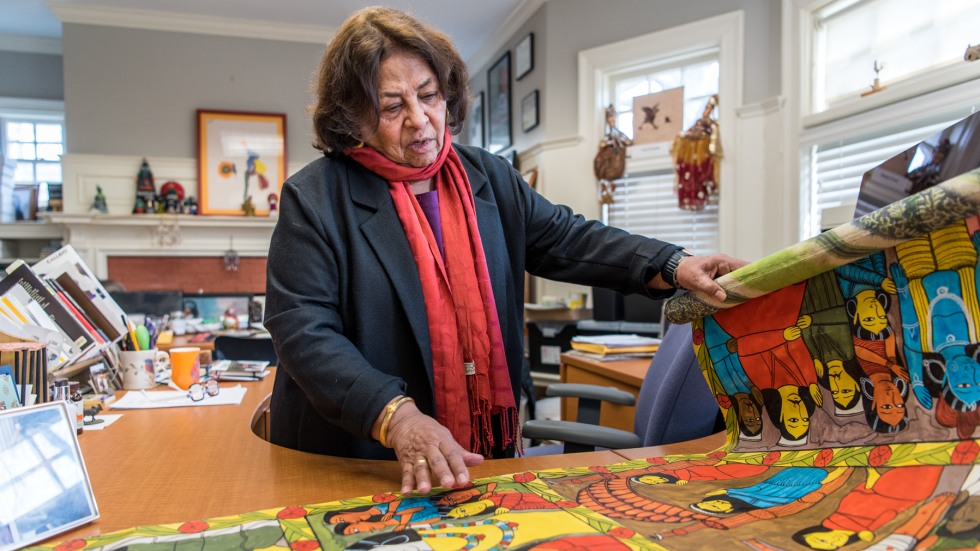
Fruzzetti studying a Naya scroll about victimization of women. (Credit: Deirdre Confar)
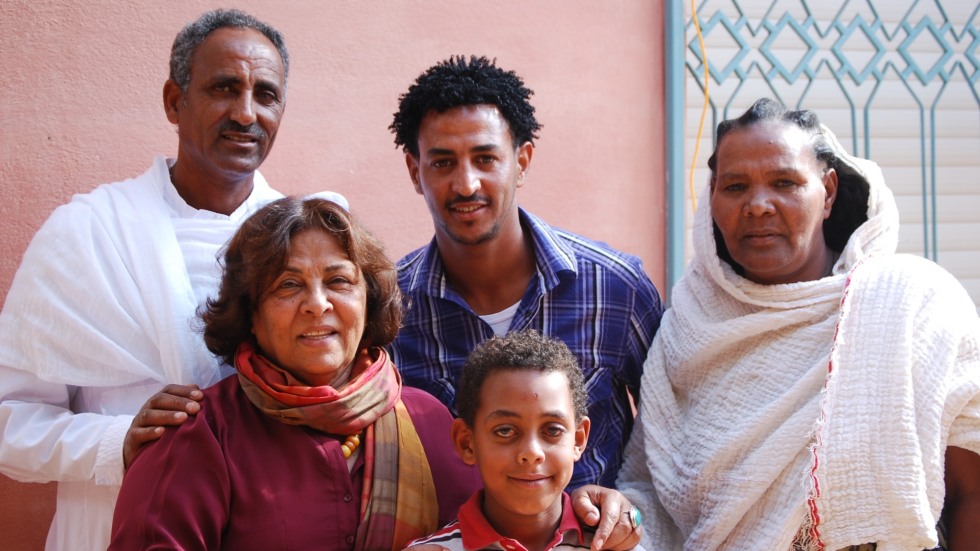
Fruzzetti in Asmara, with Maakele, the late Mebrat, and his two sons. (Credit: Fruzzetti)
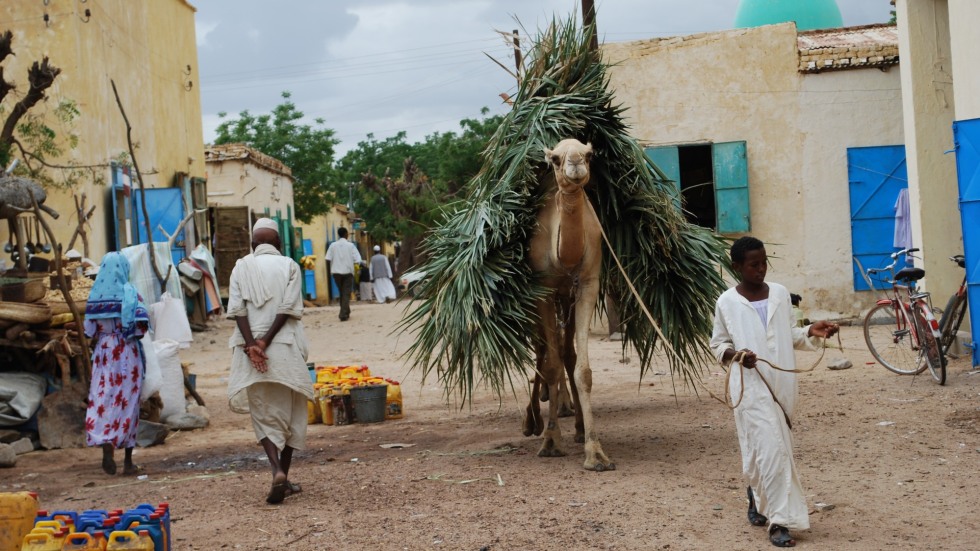
A market scene in the town of Barentu, Eritrea. (Credit: Fruzzetti)

The Naya women’s cooperative singing the story of Manasa, the goddess of snakes. (Credit: Fruzzetti)
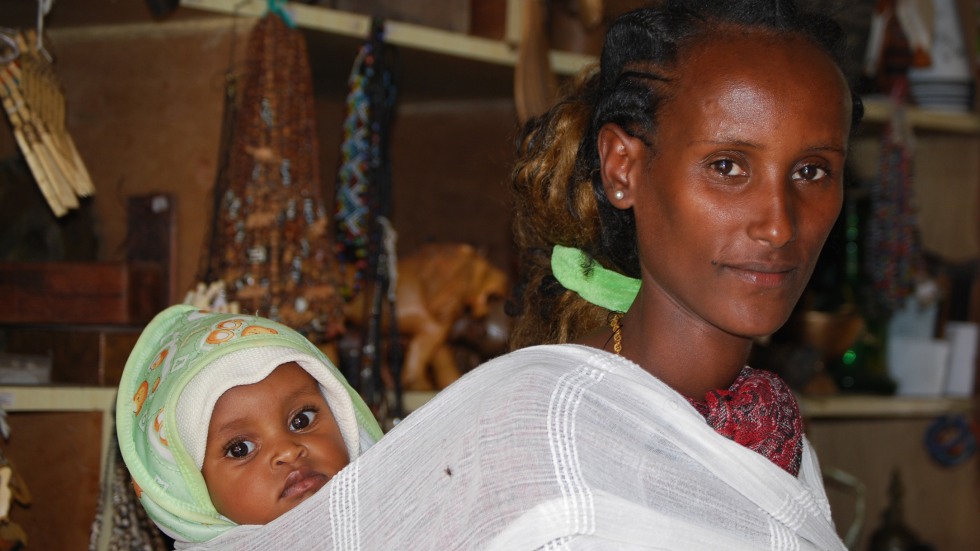
A mother and her baby in Asmara’s market. (Credit: Fruzzetti)

Muslim women in Naya, Midnapore, preparing a meal on Milad-un-Nabi, Prophet Mohammad’s birthday. (Credit: Fruzzetti)
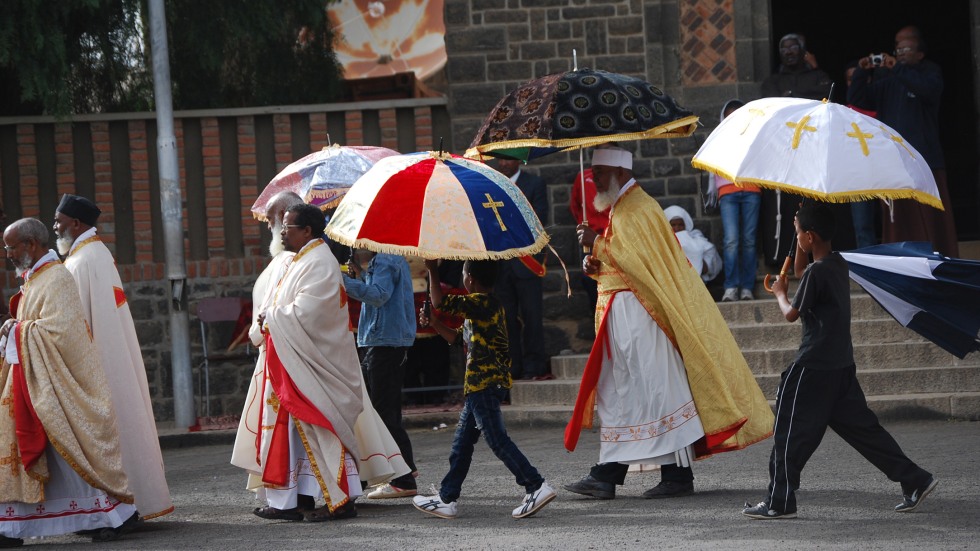
An annual Catholic festival from St Antonio Church in Asmara. (Credit: Fruzzetti)
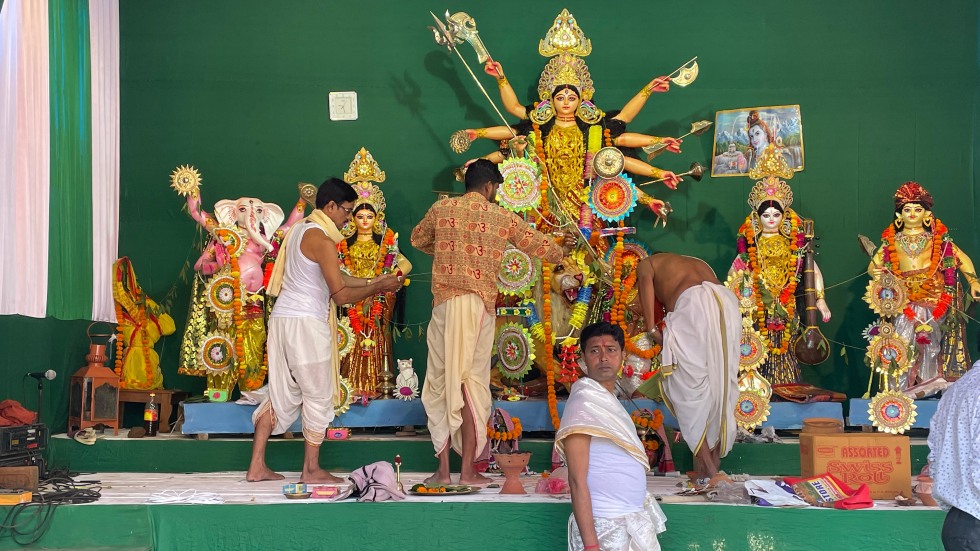
The annual festival of the mother goddess, Durga Puja in Bishnupur town. (Credit: Fruzzetti)
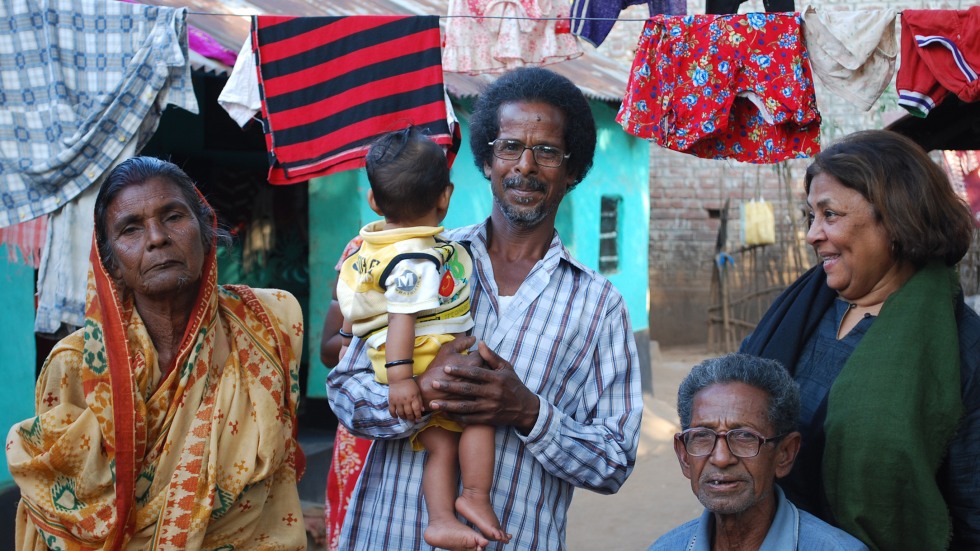
Fruzzetti visiting with Matur, a long-time interlocutor, and his son's family in Bishnupur. (Credit: Fruzzetti)
A Way to Understand Differences
Over the years, Fruzzetti taught many courses in Gender and Nationalism, Film and Anthropology, Ethnographic Research Methods, and Faces of Culture, among others.
She encouraged the students to confront misconceptions about various cultures and beliefs. For example, regarding the often-charged topic of religious differences, she told students, “There’s a way to understand differences of religion by trying to understand why others think the way they do. You can still keep your own religion, your own faith. But let’s not criticize somebody for being different. I want you to move from that realm of ignorance based on not understanding, to something more understandable.”
Beyond Brown, she taught internationally at the University of Khartoum in Sudan, the University of Dar Es Salaam in Tanzania, the University of Helsinki in Finland, the University Institute of Lisbon in Portugal, and the Indian Institute of Technology Gandhinagar in Gujarat, India.
“ There’s a way to understand differences of religion by trying to understand why others think the way they do. You can still keep your own religion, your own faith. But let’s not criticize somebody for being different. ”
From Field Research to Ethnographic Films
The intricate landscape of studying unfamiliar cultures and contrasting backgrounds is a cornerstone of Fruzzetti’s anthropological expertise.
In 1982, she published her first book, The Gift of a Virgin: Women, Marriage and Ritual in a Bengali Society, portraying the role of rituals in women’s daily lives in Bishnupur, a large town in West Bengal.
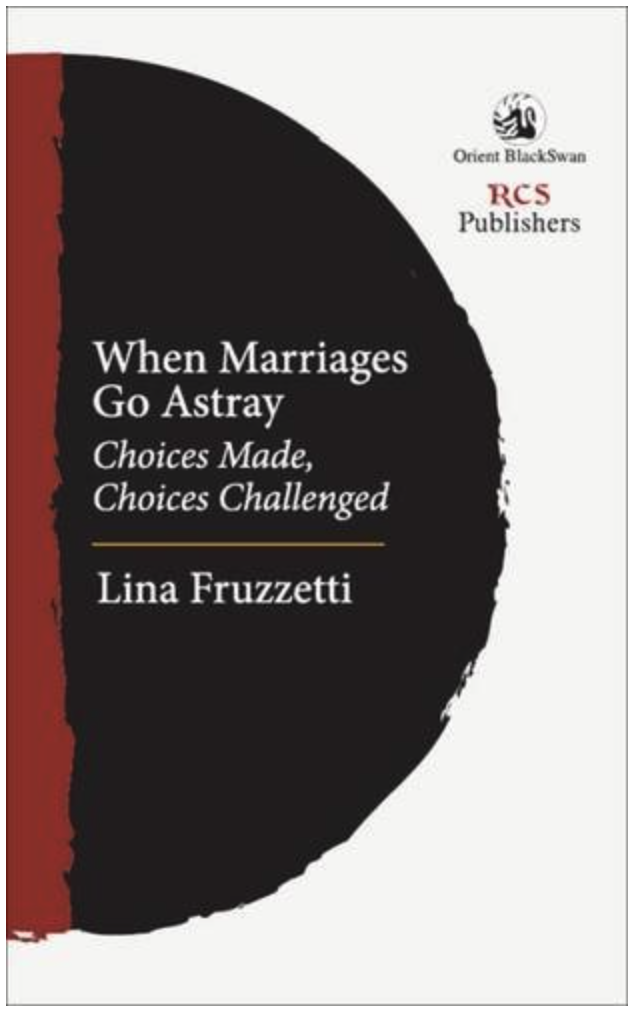
Shifting her focus to broader societal issues, including economic development and women’s empowerment, Fruzzetti published Women, Orphans, and Poverty: Social Movements and Ideologies of Work in India (1998); When Marriages Go Astray: Choices Made, Choices Challenged (2013); and Transdisciplinary Ethnography in India: Women in the Field (2022).
Her books and fieldwork led to filmmaking when one summer, her husband, Ákos Östör, professor of anthropology and film studies at Wesleyan University, was filming in an Indian village and needed Fruzzetti’s help to include the women as part of the ethnographic film. Fruzzetti’s intimate knowledge of the community, gained through years of research and publications, positioned her as a bridge. “I knew what the women did in the morning, in the afternoon, in the evening. So it was easy for me to step in and do the work.”
Once immersed in visual storytelling, Fruzzetti became captivated by its potential. She and her husband trained themselves to work with cameras and sound and co-directed and produced six ethnographic films.
Their last documentary, In My Mother’s House (2017), supported by the Carnegie Foundation, is based on 10 years of ethnographic and documentary work on her mother, Lucia Tesba Gilay, inspired by Fruzzetti’s desire to understand her mother’s heritage. The film looks at Gilay’s life in Eritrea under Italian colonial rule and Ethiopian occupation, her life as a refugee in Sudan, and finally, her return home to independent Eritrea.
Expanding on that film, the couple is now completing a new digital monograph, Carrara and Asmara: a Tale and Two Cities, that features the author’s multi-ethnic family in a broader social-historical context from 1930 to the present.
It’s About Multiplicity
Nearly 50 years after starting her job as an anthropology professor at Brown, Fruzzetti retired in May 2024.
“The skills I gained from anthropology were the skills I lived with and experienced. I had to address it when people said, ‘But you’re different,’ and I had to explain why I’m different. ‘I’m not an Arab, I’m not a Muslim, I’m not a white American.’ But I still am a person, a human being. To bring all this knowledge down to the mere fact that we all share the same kind of humanity is what you have to work at in anthropology and also in daily life—living every day, crossing the Green, seeing how people look at you, or not. It’s like living Anthropology 101 all the way.”
Reflecting on the legacy she wants to leave, she recognizes how far Brown has come, and how much distance there is still to go.
“ ... I had to explain why I’m different. ‘I’m not an Arab, I’m not a Muslim, I’m not a white American.’ But I still am a person, a human being. ”
“We have a good school and what makes this school good is the kinds of students we get and the faculty we have,” she said. “That’s why I want to see a more diverse faculty, even more so than we have. By diversity, I’m not talking about hiring only Black faculty. It’s about multiplicity. The more diverse we are, the better the campus is.”
“Students of color need that kind of mentorship. They need that kind of visibility to say, ‘There are people like me, so I can do this job, I can continue studying.’ That’s the legacy I want to leave: more people like me teaching in the different disciplines,” she said. “I also want to see people be more outspoken about injustice, equity problems of racism, or discrimination.”
Despite living so much of her life as “the other,” or maybe because of it, Fruzzetti’s legacy is one of inclusivity and aspiration. She envisions a future where academia is enriched by the presence of individuals from diverse and underrepresented backgrounds, like her own. “I offer a simple message: Respect the others as you want to be respected, and your journey will be met with a welcome.”